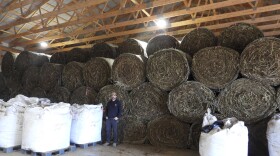-
Truffle cultivators are becoming increasingly common across Appalachia and the southeast region, and say the climate and soil quality are ideal for growing the coveted fungi.
-
Soybeans are Tennessee’s number one crop, and China has been, by far, their number one buyer. But that changed when Trump announced heavy tariffs against them earlier this year — right in the middle of harvest season.
-
Over multiple school years, Northwest High School teacher Megan Clegg developed an unused outdoor classroom space into a small livestock operation with lambs, steer, rabbits and bees on site, allowing students to get their hands dirty and experience a working farm.
-
Several Kentucky Congressmen called on U.S. House leadership to block budget language that would ban certain hemp-derived products, joining hemp farmers.
-
Carp have increasingly become a nuisance in waterways across the country. A southern Kentucky high school teacher and his students are using the invasive fish to feed injured raptors, like bald eagles, vultures and hawks.
-
Kentucky hemp farmers sent a letter to Sen. Mitch McConnell asking him for a meeting and to not again try to insert language into a bill banning certain hemp-derived products.
-
While visiting Murray State University on Wednesday as part of a week-long education initiative, Kentucky Agriculture Commissioner Jonathan Shell also spoke about how tariffs are impacting Kentucky farmers and how the state agriculture department is advocating for those workers.
-
The University of Kentucky Research and Education Center in Princeton is celebrating its centennial this year. As UKREC marks its milestone anniversary, the center is also continuing its years-long recovery from the December 2021 tornado outbreak that damaged or destroyed most of the buildings on the research station’s campus.
-
As Tennessee soybean farmers harvest their crop after a difficult growing season, they are facing a farm economy that resembles “death by a thousand cuts,” Tennessee Soybean Promotion Council Executive Director Stefan Maupin said.
-
Some farmers keep growing in flood- and drought-prone fields because subsidies soften the losses, while federal programs meant to help them change course have been underfunded and mired in bureaucracy. Under Trump, those programs may weaken further.
-
Birds in a dozen Kentucky counties have tested positive for avian influenza since October, and Kentucky officials are trying to raise awareness so that those numbers don’t soar.
-
The state of Tennessee and the city of Spring Hill will jointly pay two businesses $735,000 to settle a lawsuit alleging state and local law enforcement wrongfully seized 231 pounds of legal hemp products earlier this year, according to a statement from an attorney representing the businesses.














